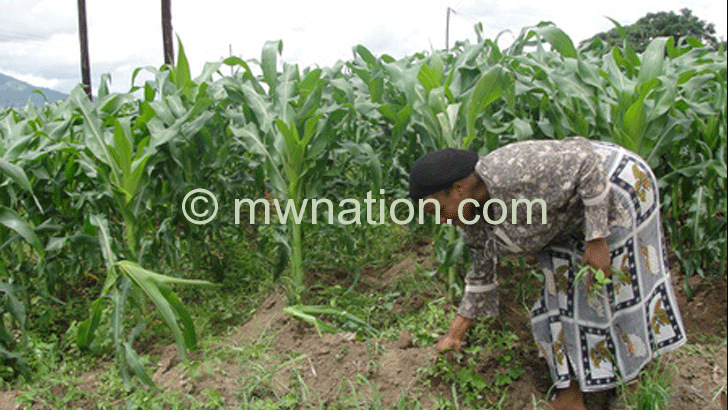Women bear the brunt of climate change
It is eight o’clock in the morning in Neno, and Agnes Jumbe, 30, has been waiting for three hours to draw water from the village borehole that serves over 300 families.
Apart from the long queue, the mother of four has other things on her mind.
Since her husband died five years ago, she has the sole responsibility of running the household. After fetching the water, she will have to collect firewood for cooking-although she has no idea what her children will eat today.

“The erratic rains have resulted in bad yields and every day, I wonder how I am going to get food for my four children as piecework has become scarce,” says Jumbe.
Unpredictable weather patterns have, in recent years, resulted in prolonged dry spells and severe floods in Malawi, making it difficult for Agnes to access the most basic necessities for her family.
According to World Bank data, 84 percent of Malawi’s 16 million people live in rural areas. As a result, millions of subsistence farmers are vulnerable to climate change.
Unreliable rains—either too heavy or none at all—stunt growth, ruin crops and result in poor crop yields. Food insecurity is rising and the country’s agricultural-based economy is suffering.
But while every sector of society is affected, it is women such as Agnes that are bearing the brunt of climate change.
“I travel long distances in search of water and firewood. Food has now become scarce and expensive,” says Jumbe.
She says the drought which Malawi experienced in 2014 and the floods that followed early 2015 disrupted the livelihood of her family. On the small patch of land that she owns, Jumbe is currently unable to produce enough food to see her family through the year. She is also unable to harvest any cotton, the crop she used to grow to earn some money.
A 2009 Oxfam report titled The winds of change: Climate Change, Poverty and the Environment in Malawi warns that in the absence of food or ability to sell crops, vulnerable women resort to sex-work and sexual favours to help feed their families, leading to an increased vulnerability to HIV and Aids.
Mary Shawa, principal secretary for Gender, Children, Disability and Social Welfare says: “The effects of climate change have increased poverty and reduced crop productivity. As a result, many women now risk going into extramarital affairs to get food for their families.”
Emanuel Ngwangwa, district forestry officer for Neno, says while the dynamics of climate change affect everyone, women usually suffer the worst consequences.
“Women have to travel longer distances in search of food, water and firewood, and this affects the agricultural productivity of their families as well as their health,” he says.
An ActionAid Malawi report titled Climate Change and Smallholder Farmers in Malawi reveals that changing rainfall patterns and higher temperatures have forced farmers to curtail their growing season and switch to hybrid crops such as genetically modified maize, hybrid potatoes and cassava. However, some experts say this approach has done little to reverse the effects of climate change.
Lawrence Phiri, project coordinator at the Community Partnership for Relief and Development (Copred), a local non-governmental organisation (NGO) training people in sustainable land use, says poverty is the main challenge as its short-term effects force people to degrade the environment to survive.
“In the wake of climate change people have resorted to burning charcoal to survive. However, these ventures further degrade the environment and make vulnerable communities even poorer,” says Phiri.
Zeferia Banda, 35, is one of the women that have tried to cope with the effects of climate change over the past few years by planting hybrid seeds.
“I have tried to plant hybrid maize which matures earlier than our local breeds, but it doesn’t withstand the hostile weather,” she laments.
Climate change is also having a negative impact on the future of young girls in Malawi. Many girls are being forced out of school for longer periods each day to help with household chores.
In addition, food insecurity is having a significant impact on their health and growth, with many young girls from the poorest families having neither the nutrition nor the time to concentrate on their studies.
This threatens to drag a whole generation of girls into poverty, while widening the gender gap.
“Issues of climate change are cross cutting and should also deal with gender as women suffer the effects of climate change from childhood,” says Fred Simwaka, Principal Gender Development Officer in the Ministry of Gender, Women, Children Disability and Social Welfare.
Meanwhile, Malawi developed its National Adaptation Programmes of Action (Napa) in 2006 in line with the United Nations Framework Convention on Climate Change, the international treaty on reducing global warming, as a strategy on coping with altered weather patterns.
However, according to ActionAid Malawi the implementation of Napa faces capacity constraints at a local level, and a lack of coordination among sectors.
Currently, aid agencies and the Malawian government are considering providing drought insurance to smallholder farmers. The Commodity Risk Management Group (CRMG) of the World Bank developed an objective indicator that could be used as a proxy measure of the exposure of Malawi’s maize production to drought, but it was poorly linked to crop yields, according to the Food Agriculture Organisation, which is now working on the idea.
At seven in the evening, Agnes has to retire to bed. Yet as she is retiring, she is gripped with fears of how she will survive tomorrow. It is a vicious cycle that is becoming increasingly hard for her to endure. n





